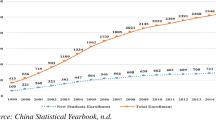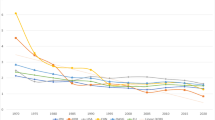Abstract
Due to the decade-long economic crisis in Greece, the number of academic personnel in tertiary education significantly decreased. To counter this, the “Acquisition of Academic Teaching Experience for New Scientists” initiative was established in 2016. The aim was to introduce young scientists as adjunct teaching personnel. In this paper, we present evidence concerning this policy measure. The data has been compiled through a survey questionnaire addressed at all the recipients of the initiative. Queries involved demographic data, potential updating of taught thematic areas and modules, and potential curbing of brain drain. In terms of results, the initiative significantly increased the number of teaching personnel. It helped update teaching modules’ content, and new teaching methods were introduced. Also, it contributed to the decrease of the outward mobility of the highly educated – a phenomenon particularly acute in Greece as a result of the economic crisis. The paper builds upon the bibliography on highly skilled human capital, its mobility, and the acquisition of new skills, such as teaching, and contributes by providing first evidence on a country-level case.





Similar content being viewed by others
Notes
The European Forum for Enhanced Collaboration in Teaching (EFFECT) project aims to facilitate the exchange of experience and effective methods in staff development of university teachers’ development (https://eua.eu/101-projects/560-effect.html) (info accessed 5 August 2019).
https://www.heacademy.ac.uk/individuals/fellowship (info accessed 18 January 2019)
https://www.education.gov.au/australian-awards-university-teaching (info accessed 6 August 2018)
https://www.stlhe.ca/ (info accessed 6 August 2019)
https://www.stlhe.ca/awards/d2l-innovation-award/ (info accessed 6 August 2019)
https://www.nsf.gov/funding/pgm_summ.jsp?pims_id=503214 (info accessed 6 August 2019)
For example, in the UK: http://www.bath.ac.uk/learningandteaching/progressing-yourcareer/teaching-awards/best-team-supporting-student-learning-award/index.html, http://www.nottingham.ac.uk/teaching/teaching/pgche/index.aspx. In the USA: http://www.nationalpostdoc.org/?page=TeachingFellowships (a complete account of per university teaching initiatives), http://www.unl.edu/gradstudies/current/development/postdoctoral-teaching-fellowships, https://umdearborn.edu/faculty-staff/faculty-and-staff-awards/faculty-awards/eugene-arden-interdisciplinary-researchteaching-award
The two universities that did not participate were the Hellenic Open University and the International Hellenic University.
References
Bernake, S.B. (2011). “Promoting research and development: The Government's role”, speech at the conference on "new building blocks for jobs and economic growth," Washington, D.C., may 16, speech #571.
Bertoli, S., Brucker, H., Facchini, G., Mayda, A. M., & Peri, G. (2011). The battle for brains: how to attract talent. In T. Boeri, H. Bruecker, F. Docquier, & H. Rapoport (Eds.), Brain gain and brain drain (pp. 84–102). Oxford: Oxford University Press.
Behrman, J. N., & Rondinelli, D. A. (2002). The cultural imperatives of globalization: urban economic growth in the 21st century. Economic Development Quarterly, 6, 115–125.
Broughan, C., Steventon, G., & Clouder, L. (Eds.). (2018). Global perspectives on teaching excellence. A new era for higher education. New York: Routledge.
Cervantes, M., Guellec, D. (2002). ‘The brain drain: Old myths, new realities’, OECD Observer, available at: http://oecdobserver.org/news/archivestory.php/aid/673/The%20brain%20drain:%20Old%20myths,%20newrealities.html (accessed 6 August 2019).
Chalmers, D. (2010). Rewarding and recognising quality teaching in higher education through systematic implementation of indicators and metrics on teaching and teacher effectiveness, National Teaching Quality Indicators Project, Sydney, NSW: Australian Learning and Teaching Council.
Diehl, P. F., & Simpson, R. D. (1989). Investing in junior faculty: The teaching improvement program (TIPs). Innovative Higher Education, 13, 147–157.
European Commission (2014). The second economic adjustment programme for Greece, fourth review – April 2014, European Union: Luxembourg, available at https://ec.europa.eu/economy_finance/publications/occasional_paper/2014/op192_en.htm (accessed 7 August 2019).
Efimenko, E., Roman, A., Pinto, M., Remiao, F., & Teixeira, P. (2018). Enhancement and recognition of teaching and learning in higher education. The Impact of Teaching and Excellence Prizes. Journal of the European Higher Education Area, 2, 99–117.
Florida, R. (2005). The flight of the creative class. New York: Basic Books.
Fry, H., Ketteridge, S., & Marshall, S. (Eds.). (2009). A handbook for teaching and learning in higher education enhancing academic practice. New York: Routledge.
Hjerm, M., Johansson Seva, I., & Werner, L. (2018). How critical thinking, multicultural education and teacher qualification affect anti-immigrant attitudes. International Journal in Sociology of Education, 27(1), 42–59.
Hendricks, L. (2002). How important is human capital for development? Evidence from immigrant earnings. American Economic Review, 92(1), 198–219.
Hunter, P. (2013). Brain drain, brain gain or brain sharing? EMBO Reports, 14(4), 315–318.
Golde, C. M., & Dore, T. M. (2001). At cross purposes: what the experiences of doctoral students reveal about doctoral education. Philadelphia: A Report for The Pew Charitable Trusts.
Kloek, T. A., Verbakel, J. R. A., Bernard, S. E., Evenboer, J., Hendriks, E. J., & Stam, H. (2012). The desirability of education in didactic skills according to medical interns. Perspectives on Medical Education, 1(5–6), 262–269.
Labrianidis, L. (2014). Investing in leaving: the Greek case of international migration of professionals. Mobilities, 9(2), 314–335.
Labrianidis, L. (2017). Why high school students aspire to emigrate: evidence from Greece. Journal of International Migration and Integration, 18(1), 107–130.
Labrianidis, L., Pratsinakis, M. (2014). ‘Outward migration from Greece during the crisis’, Project funded by the National Bank of Greece through the London School of Economic’s Hellenic Observatory 2014 call, available at https://www.lse.ac.uk/europeanInstitute/research/hellenicObservatory/CMS%20pdf/Research/NBG_2014_-Research_Call/Final-Report-Outward-migration-from-Greece-during-the-crisis-revised-on-1-6-2016.pdf (accessed 21 January 2019).
Labrianidis, L., & Pratsinakis, M. (2017). Crisis brain drain: short term pain and long term gain? In D. Tziovas (Ed.), Greece in crisis: the cultural politics of austerity (pp. 107–144). London: I.B. Tauris Press.
Land, R., & Gordon, G. (2015). Teaching excellence initiatives: modalities and operational factors. York: Higher Education Academy.
Martineau, T., Decker, K., & Bundred, P. (2004). Brain drain of health professionals: from rhetoric to responsible action. Health Policy, 70(1), 1–10.
Mazzucato, M. (2013). The entrepreneurial state. Debunking public vs Private Sector Myths. New York: Anthem Press.
Ramsden, P. (2003). Learning to teach in higher education. London: Routledge Falmer Press.
Ramsden, P., & Moses, I. (1992). Associations between research and teaching in Australian higher education. Higher Education, 23(3), 273–295.
STLHE (2019). Annual Report 2018. Canadian Society for Teaching and Learning in higher education, available at https://www.stlhe.ca/wp-content/uploads/2010/06/STLHE_AnnRpt_2018_20190524_Web.pdf (accessed at 6 august 2019).
Subbaye, R., & Vithal, R. (2015). Teaching criteria that matter in university academic promotions. Assessment & Evaluation in Higher Education, 42(1), 37–60.
Suntharasaj, P., & Kocaoglu, D. F. (2008). Enhancing a country's competitiveness through national talent management framework. Management of Engineering & Technology, 314–327. https://doi.org/10.1109/picmet.2008.4599637.
Sugimoto, C., Robinson-Garcia, N., Murray, D., Yegros-Yegros, A., Costas, R., Larivière, V. (2017). ‘Scientists have most impact when they’re free to move’, Nature, 550(7674), available at https://www.nature.com/polopoly_fs/1.22730!/menu/main/topColumns/topLeftColumn/pdf/550029a.pdf (accessed at 21 January 2019).
Triandafyllidou, A., Maroufof, M. (2017). ‘Migration in Greece: Recent Developments’, Report prepared for the OECD Network of International Migration Experts, Paris, 2–4 October 2017, available at https://www.eliamep.gr/wp-content/uploads/2018/10/Greece-report-for-OECD_2-Nov-2017.pdf (accessed 22 January 2019).
VTAS-PEN (2016). ‘Australian University Teachers of the Year, 1997–2015’, Booklet on recipients of Australian Award for University Teacher of the Year (AAUTY), available at http://aautn.org/wp/wp-content/uploads/2016/10/Profile-booklet-AAUTY-97-15.pdf (accessed 6 August 2019).
Wagner, C., Jonkers, K. (2017). ‘Open countries have strong science’, Nature, 550(7674), available at https://www.nature.com/news/open-countries-have-strong-science-1.22754 (accessed 21 January 2019).
Author information
Authors and Affiliations
Corresponding author
Additional information
Disclaimer
Authors work for the National Documentation Centre (EKT), which conducts the survey “Evaluating NSRF’s Tertiary Education Initiatives” funded by the Greek National Strategic Reference Framework (NSRF) 2014-2020.
Publisher’s Note
Springer Nature remains neutral with regard to jurisdictional claims in published maps and institutional affiliations.
Rights and permissions
About this article
Cite this article
Sachini, E., Karampekios, N. & Chrysomallidis, C. Introducing Human Capital in Greek Higher Education Institutes in the Postcrisis Era. The Case of the “Acquisition of Academic Teaching Experience for New Scientists” Public Initiative. J Knowl Econ 11, 1630–1645 (2020). https://doi.org/10.1007/s13132-020-00630-8
Received:
Accepted:
Published:
Issue Date:
DOI: https://doi.org/10.1007/s13132-020-00630-8




